|
As an alumnus and Chairman of the Dunman High School Advisory Committee, Mr Sam Goi works with the School’s various partners to chart its development.
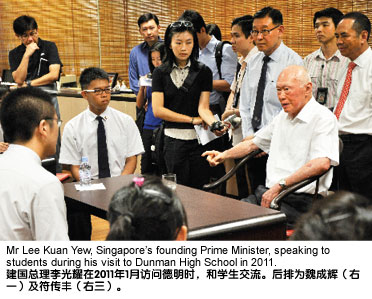 Self-made billionaire Mr Sam Goi attributes his success to the Chinese values he learnt in Dunman High School (DHS). Self-made billionaire Mr Sam Goi attributes his success to the Chinese values he learnt in Dunman High School (DHS).
One of the most important values ingrained in the Chinese-educated Mr Goi was the importance of never giving up even when the going gets tough. It is this fighting spirit that has transformed his company, Tee Yih Jia, into the global multi-million dollar business that is the largest producer of spring roll skins in the world, and which has earned him the nickname of “The Popiah King”.
“When you embark on something, give it your all,” said Mr Goi, describing the values behind his success. “Remember that failure is not an option. You must also deliver on your promises. If you can’t do something, don’t promise that you can, and no one will blame you for not being able to do it. But if you promise to do it and you don’t, then you will be blamed for making an empty promise. Having a good work ethic helps. Also, don’t be complacent. If you are, you will eventually lose out to your competitors. More importantly, you must be confident. You cannot feel inferior to others. Confidence is the key to success.”
These values have propelled Mr Goi a long way from where he started. Born in the Fujian province of China, he came to Singapore with his family at the age of six. Of humble background, he barely knew a word of English.
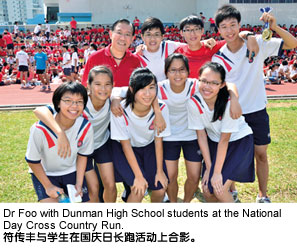 When he was in primary school, some of his classmates who were from affluent families had majies — Chinese women who took a vow of celibacy to work as maids — waiting for them outside school with food and drinks, and chauffeurs ready to drive them back to their huge bungalows. That left quite an impression on the young Mr Goi. “When I was little, I had many big dreams,” he said. “But I turned them into reality.” When he was in primary school, some of his classmates who were from affluent families had majies — Chinese women who took a vow of celibacy to work as maids — waiting for them outside school with food and drinks, and chauffeurs ready to drive them back to their huge bungalows. That left quite an impression on the young Mr Goi. “When I was little, I had many big dreams,” he said. “But I turned them into reality.”
After graduating from DHS, he worked in his father’s shop for six months. Then he decided to strike out on his own by borrowing $10,000 from his father to open an electrical repair shop. Even though his first business venture folded in less than a year as a result of his inexperience, Mr Goi picked himself up, borrowed money from his uncle and a tontine, and started all over again. This time, he was successful and his new shop raked in a revenue of $500,000 — a huge sum in those days — in just four years. Then, in 1977, Mr Goi stumbled into the food manufacturing business when he bought over Tee Yih Jia to help out a friend. The rest is history.
Today, like Mr Goi, DHS has gone far. It was selected to be one of the nine Special Assistance Plan secondary schools in 1979 because of its strong focus on bilingualism. In 2005, DHS became one of the first few secondary schools in the country to offer the Integrated Programme (IP), which allows students to progress to the A level examination or its equivalent, without having to sit for the O level examination along the way. Presently, there are only 18 IP schools in Singapore.
Mr Goi said, “I find DHS students to be different from the rest. They possess integrity and are well-mannered.”
Mr Goi is one of the wealthiest people in Singapore now, but he has retained his humility and continues to give back both to society and to his alma mater, where he spent the formative years of his life. He has been the Chairman of the DHS School Advisory Committee for more than a decade.
Forging Family Ties at School
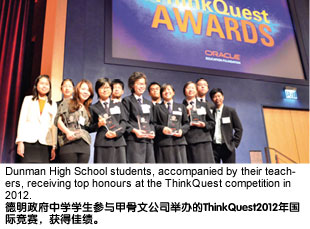 Remembering his school days Mr Goi said, “DHS was my second home. When I was a student, it was never just a school to me because of the many kind and dedicated teachers. I got along well with my classmates too, so it felt like I was part of a big family which made me feel right at home.” Remembering his school days Mr Goi said, “DHS was my second home. When I was a student, it was never just a school to me because of the many kind and dedicated teachers. I got along well with my classmates too, so it felt like I was part of a big family which made me feel right at home.”
The sense of family is clearly a constant in the School’s history. Indeed, it was a recurring idea in a series of interviews with staff and former pupils that feature in DHS’ latest corporate video. Not surprisingly, its theme is “Family”.
Dr Foo Suan Fong, DHS Principal and former DHS student, said, “When I asked the teachers what words best describe DHS, all of them, even those who are not former pupils of the School, suggested words like ‘Caring’, ‘Family’ and ‘United’. I believe that that’s what makes a good school — when teachers and students feel that they are part of a larger family and are united as one. Here at DHS, we believe that the School will always be a part of you. Once a Dunmanian, always a Dunmanian.”
Former principals and teachers are always welcome in DHS. They are invited to attend special occasions like Teachers’ Day and the School also sends them a Chinese New Year card every year. In fact, Dr Foo makes it a point to meet with the former principals of DHS at least once a year, either over a meal or at a school event.
Mr Teo Kek Yeng, an old boy and current President of the DHS Alumni, said, “Thankfully, there has always been close collaboration between the School, the School Advisory Committee and the Alumni. We work very well together.”
The School Advisory Committee, Alumni and even parents from the Parent Support Group meet on a regular basis. They bond over karaoke sessions, go on overseas trips, and forge a supportive network which gels the School’s past and present together.
“For the School to continue to do well, the principal and teachers must continue to work with the School Advisory Committee and the Alumni. A single person or group will not be able to do much for the School. It is only when we work together that we can succeed,” said Mr Goi.
And in realising this success, the School Advisory Committee which Mr Goi chairs plays a crucial role.
DHS School Advisory Committee
The DHS School Advisory Committee comprises a number of remarkable individuals who, like Mr Goi, are also industry leaders.
Asked why he devotes his time to the School, Mr Goi said, “Like me, Dr Foo and Mr Teo, who are still giving back to the School, are former pupils of DHS. I can’t put it into words but it’s entirely different when former pupils take on key roles that shape the development of the School. It simply feels different. Not only am I proud of what the School has accomplished thus far, I am also proud to be an alumnus of DHS. Even now I feel a very strong sense of belonging to the School.”
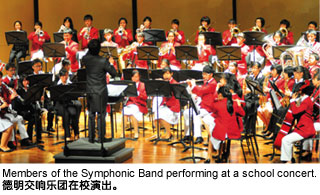 The Advisory Committee helps to raise funds for special projects such as the expansion of the school campus. These funds also go towards rewarding teachers for their hard work and assisting needy students in the form of scholarships and bursaries. The Advisory Committee helps to raise funds for special projects such as the expansion of the school campus. These funds also go towards rewarding teachers for their hard work and assisting needy students in the form of scholarships and bursaries.
“Without the School Advisory Committee, which generously funds these activities, it would be very difficult for the School to organise them,” said Dr Foo.
However, contrary to common perception, the Committee is not only concerned with dollars and cents.
The Committee members attend major school functions like dance performances to lend moral support and offer students opportunities to do internships at their companies. With their connections, they also initiate events such as inviting notable individuals to visit the School in order to raise the School’s profile.
Mr Goi added, “These visits are exceptionally meaningful as students are heartened to know that these important people in society are also interested in the progress of DHS and have made the effort and time to visit the School. Knowing that can be a source of encouragement for the students to work harder.”
To motivate students to strive for excellence, the Committee also arranges for extraordinary alumni to give inspirational talks. Their return exemplifies the idea of remembering one’s roots and sets a good example to those who are still in school. With this sort of school spirit it is unsurprising that upon graduation many students join the Youth Alumni.
DHS Youth Alumni
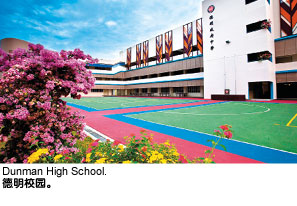 As members of this youth branch of the Alumni Association, former students spend their time supporting their juniors, in terms of dispensing advice. They return to share information on matters such as dealing with the often complicated overseas university applications processes, choosing the right university and course, and understanding the differences between studying in a British and an American university. As members of this youth branch of the Alumni Association, former students spend their time supporting their juniors, in terms of dispensing advice. They return to share information on matters such as dealing with the often complicated overseas university applications processes, choosing the right university and course, and understanding the differences between studying in a British and an American university.
“There are many ways one can give back to one’s alma mater. The Youth Alumni members may not have the means to make substantial monetary contributions to the School but what they do is invaluable. Many of them are studying overseas so they share their experiences with the current students,” explained Dr Foo.
On 20 July 2013, the Youth Alumni held the fourth annual Youth Alumni Homecoming which was attended not only by the alumni, but also by former teachers. The success of this event demonstrates the level of emotional attachment many have for their alma mater. Clearly, the core partners of the School share a common desire: nothing but the best for Dunman High School.
|